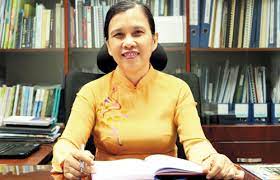“Feminism: Past and Present” A Colloquium at the PACE Institute of Directors
GAS-On
the 5th of March 2011 a colloquium “Feminism: Past and Present” was
held at the PACE Institute of Directors, in
Vietnamese society, in spite
of its matriarchal origin, was significantly influenced by Confucianism which
defines women as inferior to men. From 1918 on, due to better education
opportunities for women as well as increasing exposure to Western thoughts,
development of Vietnamese feminism was remarkable as result of writings and speeches by such influential
feminists as Sương Nguyệt Anh, Đạm Phương, Phan Thị Bạch Vân, Nguyễn Thị Kiêm
and others.
Many interesting questions
and ideas were raised by the participants during the discussion session that
followed Dr. Phuong’s presentation, drawing on observations and concerns about
gender equality issues in today’s context. Her talk clarified that feminism
does not mean women demanding privileged treatment, or to reverse feminine
traits or all traditional gender roles. Gender equality essentially means that women
are respected, are given options and opportunities, and have the freedom to
make decisions on equal terms with men.
For instance, modern
women in family or in romantic relationships are not necessarily ‘masculine’ or
egoistic. On the contrary, today’s women can always embrace the best
traditional feminine qualities: loving, giving, caring and supporting, etc, in
a society where gender equality is embedded as a social norm. However, house
chores, child-raising and other family responsibilities should be reasonably
shared among family members on the basis of mutual respect and understanding of
one’s capabilities as well as limitations. In so doing, women are liberated
from irrational burdens caused by unfair stereotypes of gender roles. A
participant gave a good example; she is a wife who cannot cook, however, she is
still very happily married because her husband understands and accepts her
limitations. As such, the family is free from unnecessary tensions when family
members, particularly the husbands, can adapt to an open and fair attitude toward
women’s roles, even if their partners do not conform to the conventional
criteria of a good, skillful wife.
In
short, gender equality as the term suggests means women have become equal to
men; both men and women should be equally respected and not be judged according
to stereotypes. Achieving gender equality in today’s society requires both
men’s and women’s awareness of gender equality and women’s efforts to affirm
themselves as well as to obtain social assistance to empower themselves in
underprivileged situations.
As a conclusion to the three-hour
colloquium, most participants agreed that ultimately promoting gender equality
in today’s society means simply to ensure human rights for everyone and to disregard
their innate sex or sexual orientation. Building a society where everyone is
equal is essentially building a more humane, improved, fairer and happier
society where everyone, men and women alike, are appreciated, respected, and have
the freedom to pursue their dreams and realize their potential to the fullest.
Reported
by Ngoc Yen (

Không có nhận xét nào: